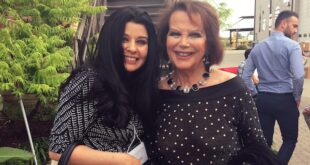
She has worked with a few masters of contemporary Italian cinema and she is just getting started.
Angelica Cacciapaglia was born in Ponte dell’Olio in the region of region Emilia-Romagna and grew up in Milan in a family of artists. Her childhood was spent cultivating a passion for acting. She studied her craft at the Teatro Libero di Milano and employs the Voice Craft method, a technique that maximizes one’s vocal talents. After high school, she moved to Rome and attended a number of acting workshops, studying under the direction of the New York Film Academy’s Anna Maria Cianciulli, and learning the Strasberg method with German coach Lena Lessing.
She made her big-screen debut in Franco Battiatio’s 2003 “Perduto Amor” (Lost Love) and has gone on to work with directors like Claudio Caligari and Paolo Sorrentino. I caught up with Ms. Cacciapaglia and asked her about those experiences and the quality of roles being offered to women in Italy.
Fra Noi: First, let’s talk about Franco Battiato’s film, which was also his feature film directorial debut. It’s a biography based on his experience as a singer, songwriter and poet. What do you remember about Battiato as a director?
Angelica Cacciapaglia: The film “Perduto Amor” was my very first cinema experience. Franco Battiato was truly unique, transmitting strength and tranquility at the same time. We shot on the Catania beach, which was completely covered with ash because Etna was erupting in those days. There were so many emotions. I was on my first set and I was in Sicily, which is also partly my land, next to a songwriter I have always loved and on stage with a great actor like Gabriele Ferzetti. It was a unique experience that I will always carry in my heart.
FN: Paolo Sorrentino’s films have easily transitioned to American audiences. Tell me about your experience working on “Loro.”
AC: Working with Paolo Sorrentino is like entering a parallel world. You feel catapulted into another dimension. We shot partly in Rome and partly in Tuscany, in Ansedonia, where I spent a whole week with all the cast and crew. Those days were like a film within a film for me. It was very fascinating to see how at the beginning of each day, Sorrentino scrutinized the set and all the actors, always finding inspiration from what that moment brought him.
FN: Have you always felt that acting was your path in life?
AC: I took my first theater course at the age of twelve, but then my path was not always linear. I attended several schools and seminars but I studied at the same time. I went to classical high school and then university. Once I graduated, I finally found the courage to make acting my job and therefore my life.
FN: Are there any actresses that influenced you when you were young?
AC: There are two actresses that I have always loved most of all. They are Gena Rowlands and Monica Vitti, but certainly also Liv Ullmann, Meryl Streep, Olivia Colman and many others.
FN: What do you think about the roles being offered to women? It seems that there are many more women directors now and they are telling women’s stories.. So unlike the past, women are the protagonists and not just in supporting roles like the wife and mother. Is that a fair assessment?
AC: It is true that the situation is slowly changing even if the road is long. Male roles are still the most numerous and with the most space but I am still confident because there are still so many stories of wonderful women that need to be told.
FN: Tell me about your current project, “Dark Matter.”
It is a thriller written and directed by Stefano Odoardi and is an Italy/Holland co-production. I find that creating synergies between countries by combining different backgrounds in the cast and workers always brings interesting and enriching results. The film touches on strong themes such as kidnapping and the crumbling of family relationships but in the end leaves a message of positivity.
FN: Is there a director you’d like to work with in the future, or have you ever thought about directing?
AC: There are many directors that I respect both Italians and foreigners, and also I am always curious and eager to delve into new stories and new roles. In the last few months I have dedicated myself to my first short film which I wrote, directed and performed. I was able to make the film thanks to funding I received from the Ministry of Culture. It was an all-encompassing experience, not without effort, but also satisfaction.
For more information about Angelica Cacciapaglia, click here.
 Fra Noi Embrace Your Inner Italian
Fra Noi Embrace Your Inner Italian





